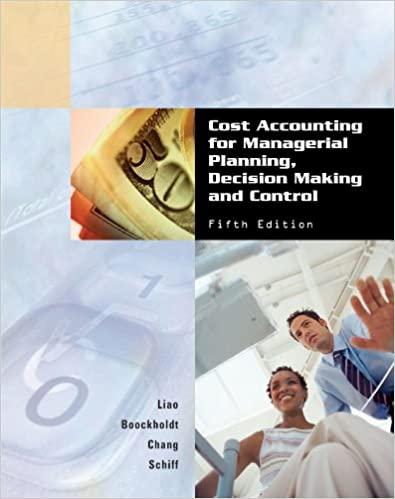Question
Grocery Inc. (Grocery or the Company), an SEC registrant, is a wholesale grocery distributor and retailer in the United States. One of the Companys core
Grocery Inc. (Grocery or the Company), an SEC registrant, is a wholesale grocery distributor and retailer in the United States. One of the Companys core businesses is distributing grocery products to restaurants. Fresh Express Inc. (FEI) operates a chain of restaurants throughout the world and contracts with manufacturers to obtain grocery and related products for the chain. Manufacturers either deliver the products to FEIs restaurants directly or, more commonly, contract with distributors such as Grocery to deliver the products.
The following steps summarize the flow of transactions when a manufacturer contracts with distributors (e.g., Grocery) to deliver products to restaurants designated by FEI:
1. The manufacturer provides FEI with the details of each product to be sold to the restaurants, and FEI approves the products on the basis of the specifications outlined by the manufacturer. Once the products are approved, FEI enters into a master contract with the manufacturer to supply the products (the Master Contract).
2. The manufacturer selects a distributor (e.g., Grocery) to be named as the official representative to FEI. The manufacturer and Grocery enter into a distribution contract (the Distribution Contract), which typically specifies a. the restaurants that the Company may supply to on behalf of the manufacturer, b. the manufacturers products that have been approved by FEI to be supplied, c. service and delivery requirements, and d. payment terms.
3. Grocery issues a purchase order to the manufacturer for products. The products are then delivered to the Company and held in the Companys distribution warehouses. Title of the products transfers from the manufacturer to the Company in accordance with the shipping terms specified in the Distribution Contract. The Company is required to keep inventory on hand, regardless of whether FEI has placed an order for the products.
4. The Company pays the manufacturer for the inventory on the basis of the published distributor list price at the time of purchase (Distributor Product Cost).
5. As restaurants need to be restocked, FEI identifies the manufacturer that sells the necessary products, determines which distributor is the manufacturers official representative for a particular restaurant, and then issues a purchase order with that distributor (e.g., Grocery) under the terms of FEIs Master Contract with the manufacturer.
6. The Company, acting as the distributor, locates the products ordered by FEI in its existing inventory and ships the products to the restaurants designated by FEI. Generally, title of the products transfers directly from the Company to FEI (i.e., title of the products does not revert back to the manufacturer).
7. The Company invoices FEI on the basis of the price agreed to and included in the Master Contract between the manufacturer and FEI (FEI Product Cost).
Additional information related to Grocerys operations:
The Distribution Contract explicitly states that Grocery may not sell the products it purchases under such contract to customers other than FEI without obtaining permission from the manufacturer. The Company has a past business practice to request such permission before selling products to others. However, if a perishable product is nearing its expiration date, the Companys customary business practice is to sell the product to another customer without obtaining the manufacturers permission, even if the contract requires such permission.
Typically, the Company may only return products to the manufacturer for quality related issues. In most cases, the Company is liable for any obsolete products and may not return such products to the manufacturer.
The manufacturer is responsible for the acceptability of products from a customer specification perspective (i.e., the manufacturer must meet the product specifications approved by FEI).
Grocery is responsible for the acceptability of products from a quality perspective, and therefore is responsible for any damaged or obsolete products delivered to the restaurants.
Grocery has title to the inventory that it purchases from the manufacturer and currently pledges such inventory as collateral for borrowings under the Companys credit agreement. On average, approximately 15 percent to 20 percent of the Companys borrowings under its current credit agreement are secured by pledging inventory that will be sold to FEI.
The Company does not have discretion in establishing the price paid by FEI under the Master Contract (i.e., the FEI Product Cost). The FEI Product Cost is established through negotiations between FEI and the manufacturers.
Grocery negotiates with the manufacturers for purposes of establishing the Distributor Product Cost, which is established in the Distribution Contracts with manufacturers. Therefore, the Company bears the risks and rewards of changes in the Distributor Product Cost between when it purchases the products from the manufacturer and when the products are sold to FEI.
Question:
Pursuant to ASC 606 and IFRS 15, Revenue From Contracts With Customers, determine whether Grocery is a principal or an agent in the arrangement to supply products to the restaurants designated by FEI, and therefore whether the Company should recognize revenue on a gross or net basis.
Step by Step Solution
There are 3 Steps involved in it
Step: 1
To determine whether Grocery is a principal or an agent in the arrangement to supply products to the restaurants designated by FEI we need to analyze the substance of the arrangement against the guida...
Get Instant Access to Expert-Tailored Solutions
See step-by-step solutions with expert insights and AI powered tools for academic success
Step: 2

Step: 3

Ace Your Homework with AI
Get the answers you need in no time with our AI-driven, step-by-step assistance
Get Started


